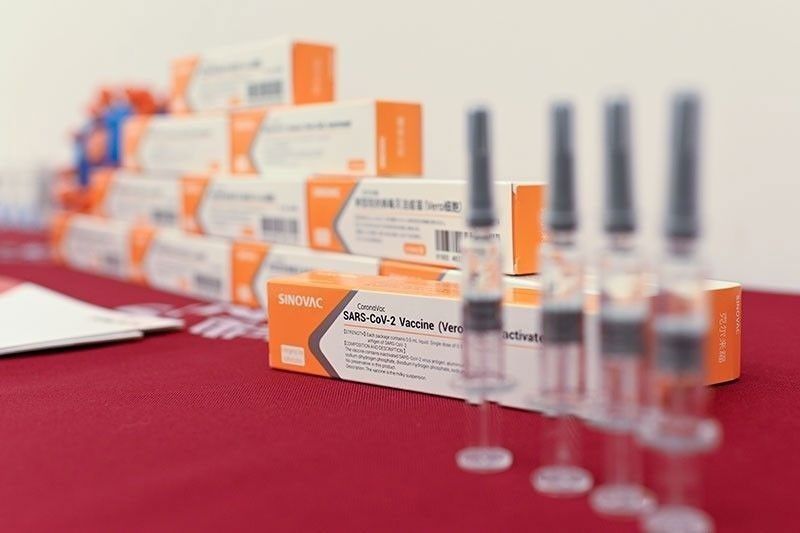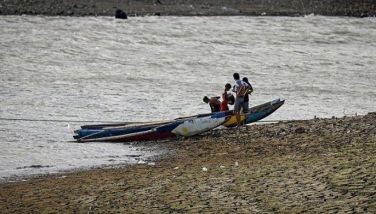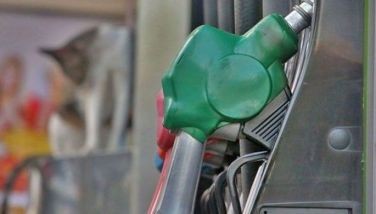Why the Sinovac vaccine isn't for medical workers, senior citizens despite FDA approval

MANILA, Philippines — The grant of Emergency Use Approval to Chinese drugmaker Sinovac while not recommending it for use by health workers and the elderly has stirred up questions and criticism over the move.
The Food and Drug Administration cleared the jabs this week for use on "clinically healthy" individuals between 18 to 59-year-olds after experts' reviews an trials that showed an 65.3% efficacy rate in Indonesia and 91.25% in Turkey.
But the exception for health workers has raised concerns over the jabs really work and are really safe.
FDA chief Eric Domingo, in announcing the grant of the EUA, said Sinovac "is not the most ideal vaccine" for medical personnel because they are constantly exposed to the risk of virus transmission
According to trials in Brazil involving health workers who have had interaction with COVID-19 patients, the jabs yielded only a 50.4% efficacy. The rating was only slightly higher than the World Health Organization's threshhold for deciding on vaccine use.
Efficacies of same vaccine vary depending on test group
This was backed by Dr. Rontgene Solante, an infectious diseases expert at the San Lazaro Hospital in Manila.
Speaking to ONE News' "The Chiefs" on Monday night, he explained that vaccines have different efficacies depending on the group of individuals it was tested on.
"In this particular study (Brazil), they found out that the efficacy among these high-risk health workers is really low," he said. "That's the beauty of a Phase 3 clinical trial, you will be able to know and look at [the] efficacy of the vaccines in different target population."
The clinical trials in Jakarta and Ankara involved volunteers from various fields, while the one in Brasilia was concentrated on medical personnel.
Solante said the 50.4% efficacy was from a study focused on high-risk health workers who face different levels of exposure than regular people do.
"If you are a frontliner and you are seeing patients... perhaps your risk could be at 50 to 60%," Solante said partly in Filipino. "But if you are in the general population and not working in a hospital, your risk is really lower than that of health workers."
Hospital personnel are at the top of government's priority list to be vaccinated for the coronavirus, followed by senior citizens, the indigenous and marginalized as well as the police and military.
Already, the Philippines is set to receive some 600,000 doses of Sinovac as a donation from Beijing, while the administration has signed a term sheet with the company for 25 million more doses.
'Trust the experts'
The arrival of other brands of vaccines, however, is facing significant delays particularly the 117,000 doses of Pfizer and 5.5 million of AstraZeneca from the COVAX facility.
"We are placing our health workers and elderly people at further risk every day in the delay of the vaccine procurement," said Rep. Carlos Zarate (Bayan Muna party-list). "This dilly-dallying affects not only our economy but also the very lives of our people."
House Minority Leader Joseph Stephen Paduano (Abang Lingkod party-list) warned too that the FDA's approval of Sinovac for emergency use while advising against its use on health workers and senior citizens has further "eroded public trust and confidence in inoculation."
Paduano sought clarification from health authorities on the issue.
In a television interview, Dr. Lulu Bravo, who is the executive director of the Philippine Foundation for Vaccination, stressed that experts have studied vaccines they have granted EUAs for.
"It is the vaccine experts who really looked and investigated all the studies," she told "Headstart" on ANC. "[They] were there, they really looked at the data and as I have always mentioned, we have to trust the experts."
Aside from securing the jabs amid a global race, the Philippines has had to struggle with ramping up the public's trust on getting vaccinated once the doses arrive.
It came after a Pulse Asia survey in January revealed that 47% said they would not be inoculated with most of them concerned on its safety.
Adding to doubts on Sinovac is criticism of the government for seeming to favor the Chinese-made jabs over others that have reported higher efficacy rates.
To date, Sinovac has yet to submit its Phase 3 clinical trial data to medical journals for peer review, unlike its competitors Pfizer, AstraZeneca and Moderna.
Despite the concerns, Bravo maintained that the "best vaccine is the one that will be available to you [that] is approved by the experts."
"I have seen how they have discussed and painfully debate all the issues that are here," she said. "It is not easy to have to make the decision, but these decisions are made by experts, by people who have poured and looked at the data." — with reports from Gaea Katreena Cabico
- Latest
- Trending































